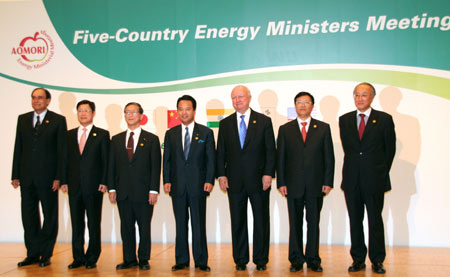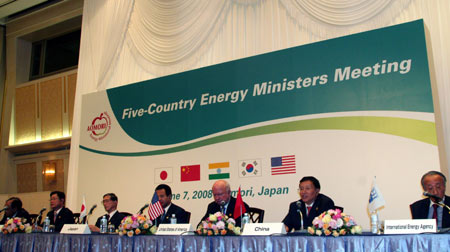 Participating officials pose for a group photo after the energy ministers' meeting at Aomori, Japan, on June 7, 2008. Energy ministers from Japan, the United States, China, India and South Korea agreed to adopt comprehensive measures to deal with the current rocketing crude oil prices during their meeting here on Saturday. (Xinhua Photo)
Participating officials pose for a group photo after the energy ministers' meeting at Aomori, Japan, on June 7, 2008. Energy ministers from Japan, the United States, China, India and South Korea agreed to adopt comprehensive measures to deal with the current rocketing crude oil prices during their meeting here on Saturday. (Xinhua Photo)
Energy ministers from Japan, the United States, China, India and South Korea agreed Saturday to adopt comprehensive measures to deal with the current rocketing crude oil prices.
The measures include improving investment environment, strengthening energy saving efforts, expanding oil stockpile for emergency use and developing alternative energy forms, according to participating officials at a joint press conference following their one-day meeting.
Zhang Guobao, vice chairman of China's National Development and Reform Commission, said in his speech in an afternoon session on energy security that to safeguard the global oil market and resolve the issue of surging and fluctuating oil prices, major countries have to boost investment into oil exploitation, preserve world political stability and minimize geopolitical impacts on oil markets.
Zhang accentuated the necessity to analyze the relationship between oil prices and the global financial market. He urged for improving the institution of the international energy market and checking speculation by flowing capital.
 Zhang Guobao (2nd R), vice chairman of China's National Development and Reform Commission, speaks at the joint press conference after the energy ministers' meeting in Aomori, Japan, on June 7, 2008. Energy ministers from Japan, the United States, China, India and South Korea agreed to adopt comprehensive measures to deal with the current rocketing crude oil prices during their meeting here on Saturday.(Xinhua Photo)
Zhang Guobao (2nd R), vice chairman of China's National Development and Reform Commission, speaks at the joint press conference after the energy ministers' meeting in Aomori, Japan, on June 7, 2008. Energy ministers from Japan, the United States, China, India and South Korea agreed to adopt comprehensive measures to deal with the current rocketing crude oil prices during their meeting here on Saturday.(Xinhua Photo)
China has adopted an active attitude toward adjusting and optimizing the industrial structure, and has been pushing forward the energy efficiency in an all-around manner by eliminating outdated productivity, Zhang said, adding that the proportion of atomic energy, wind power, solar energy and biofuel energy has significantly increased in China during the past several years.
At the joint press conference, Japanese Economy, Trade and Industry Minister Akira Amari said the current "abnormally high" oil price damages interests of both the producing and the consuming nations.
Amari also said representatives from the five participating countries agreed on the necessity to stop subsidies to processed oil products step by step.
U.S. Energy Secretary Samuel Bodman said the rise of crude oil price, which doubled in the past 18 months, was an accumulated consequence since the international community had not paid enough attention to the market in the past 30 years. He pointed out that although little could be done to change the market trend in the short term, the improvement of energy efficiency could help mitigate the impact of high oil prices on economies.
International Energy Agency Executive Director Nobuo Tanaka, who was invited to attend the meeting, stressed the need to keep the transparency of the oil market, calling for more reliable data and information for the construction of a more healthy and well-balanced market.
The five-party energy ministers meeting, initiated by China, was the second of its kind following the first one in Beijing in December 2006.
China, Japan, South Korea, the United States and India take up about 50 percent of world energy consumption and about 67 percent of world oil consumption.
The meeting was one day prior to the Group of Eight Energy Ministers Meeting and the G8 plus China, South Korea and India energy ministers meeting.
(Xinhua News Agency June 8, 2008)